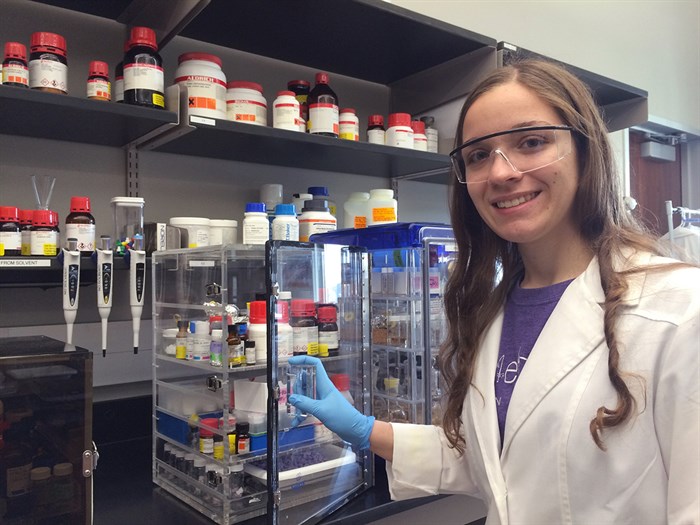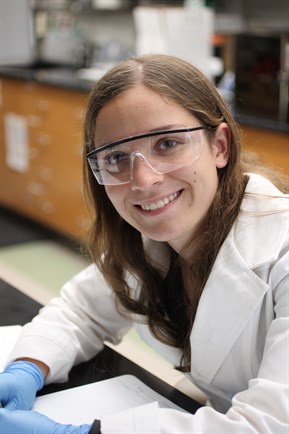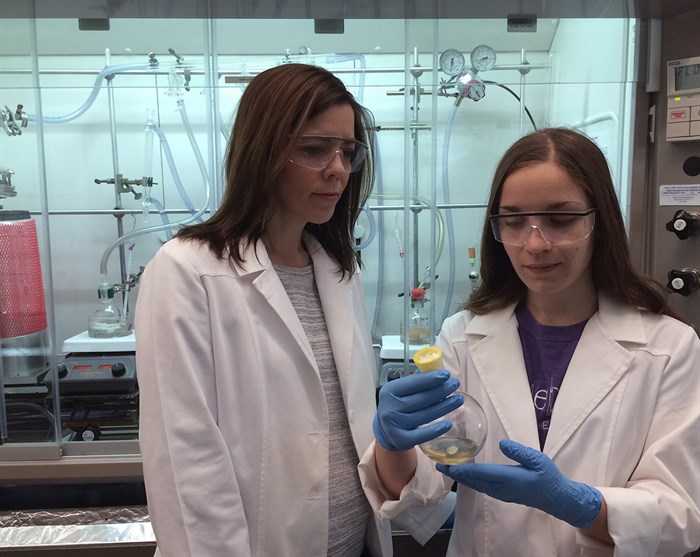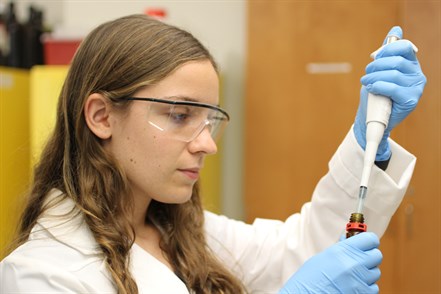
Mikayla Barry, senior biomedical engineering student at Texas A&M University, is a pioneer in more ways than one. As Texas A&M’s first Beckman scholarship winner and the first biomedical engineering student to be awarded a scholarship from the Astronaut Scholarship Foundation (ASF), she is no stranger to awards. Barry recently attended a public lecture and presentation with Apollo 13 astronaut Fred Haise where she and another student received their scholarships from ASF.
 Barry already has the distinction of being published twice as an undergraduate student and has played an active part, through her research, in the development of a life-saving polymer coating technology that could prevent clotting and infections that are common with implanted devices. In addition to the many hats she wears as a researcher, student and symphonic band performer, the role she is most passionate about is that of a science, technology, engineering, mathematics (STEM) research ambassador, which is in part what motivated her to apply for the ASF scholarship.
Barry already has the distinction of being published twice as an undergraduate student and has played an active part, through her research, in the development of a life-saving polymer coating technology that could prevent clotting and infections that are common with implanted devices. In addition to the many hats she wears as a researcher, student and symphonic band performer, the role she is most passionate about is that of a science, technology, engineering, mathematics (STEM) research ambassador, which is in part what motivated her to apply for the ASF scholarship.
“I really liked the message of the ASF organization because their focus is not only on advancing the field but being a representative of science to the larger community,” Barry said. “That is something that I am very interested in doing.”
Barry’s STEM outreach is a part of the Texas A&M University learning communities, academic excellence, undergraduate research, national fellowships, capstones, and honors programs (LAUNCH), and helps get the message out that research at Texas A&M is alive and well and both undergraduate and graduate students can participate.
Her experience comes first-hand. Only one year into her degree, Barry began research work on developing a polymer coating that prevents bio-fouling, or a process that occurs when the body’s proteins attach to things such as catheters and synthetic implants and have a negative reaction. Barry explains that once the body recognizes the proteins that attach to the implant, the body will mark it as foreign and infections or worse can happen. Her aim is to prevent the process entirely.

“The idea is that if you can prevent any sort of bio-adhesion, or those proteins from sticking to the surface of the implant, you can stop anything negative from happening,” Barry said. “So it has applications in preventing bacterial infections, blood from clotting and even applications in the marine industry that we can use, which is all pretty exciting.”
The work Barry does now has shifted more into chemistry, working with biomaterials such as silicone to make the implanted devices more biocompatible.
“With my current application I am using this in blood for use with catheters,” Barry said. “Current catheters have a problem with clotting due to bio-fouling, so instead of putting people on blood thinners we're trying to change the chemical surface properties of our silicone so that the proteins won't stick to the catheters.
At 22, Barry is participating in work that is helping to improve medical applications for the world, yet she is careful to not place it on a pedestal.
“It’s really easy to characterize science specifically for being for the betterment of mankind, but there are so many other things that fall into that category,” Barry said. "I play the piccolo and I like to think that [my musicianship] betters people's lives as a part of the human experience. We are all active in that betterment and my research experience is not particular to me; a lot of my friends are published as well.”
 Looking forward, Barry is considering pursuing a position in academia or possibly doing research at a national lab, but above all, she wants to be a mentor. Barry admires her research mentor, Dr. Melissa Grunlan for her technical expertise and her ability to mentor and provide guidance to others, something Barry hopes to emulate one day.
Looking forward, Barry is considering pursuing a position in academia or possibly doing research at a national lab, but above all, she wants to be a mentor. Barry admires her research mentor, Dr. Melissa Grunlan for her technical expertise and her ability to mentor and provide guidance to others, something Barry hopes to emulate one day.
“Outreach gives me a special sense of fulfillment,” Barry said. “Helping people get started on the same path is great because from my perspective I know how rewarding research can be. It transforms your college experience from just learning material into learning material through an application that leads toward the betterment of society towards the betterment of society. Any chance I have to participate in those activities or guide others to them is very fulfilling."